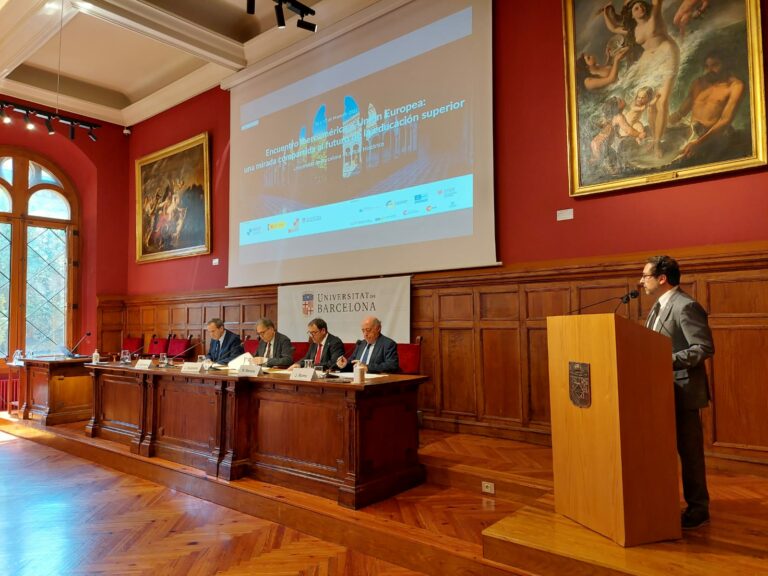Juan Romo: University poised to play key role in lifelong learning with micro-credential offerings.
The president of Crue Universidades Españolas and rector of Universidad Carlos III de Madrid, Juan Romo, participated in the opening of the Conference “Universities and Lifelong Learning” in the Aula Magna of the Universitat de Barcelona . This event was the first of the World Higher Education Week 2022 in Barcelona, which will culminate with the UNESCO World Conference on Higher Education, and was attended by the Minister of Universities, Joan Subirats; the rector of the University of Barcelona, Joan Guàrdia; the Secretary of State for Employment and Social Economy, Joaquín Pérez, and the Head of Unit for Higher Education Policies and Programs of the European Commission’s Directorate General for Education, Youth, Sport and Culture, Vanessa Debiais-Sainton, who was connected remotely.
In his speech, the new president of Crue said that the Spanish university is ready to “play a fundamental role” in the field of lifelong learning and stressed the “exponential” growth of the so-called Lifelong Learning, essential in this “fourth industrial revolution” that we are living and that requires constant reinvention. “We must make the way in which knowledge is transmitted more flexible, introduce micro-credentials, provide open offers where personalized and tailor-made paths must be designed for those who choose to continue training,” he said.
After stressing that, in a knowledge-based economy, “occupational training and lifelong learning at a higher level must be a priority in active public policies for employment and for social cohesion and active aging”, Romo highlighted the opportunities offered by RD 822/2021, which introduces for the first time own qualifications and, in particular, micro-credentials. As he explained, these will allow, in a European and international framework, “to certify learning outcomes acquired in very different training environments”. In this regard, he recalled that “the European Commission adopted a proposal for a Council Recommendation on a European approach to micro-credentials for lifelong learning and employability in order to promote inclusion and equal opportunities”.
For the president of Crue, this concept of lifelong learning “makes it necessary to implement specific training programs, aimed at graduates who wish to complete their training”, but also at workers “with particular training or specialization course needs and people who wish to increase their culture”. However, he warned that the general or on-demand programming of this teaching and its subsequent implementation “must also have platforms for its development and management, as well as evaluation and quality assessment programs that allow its evaluation”.
Romo specified that Crue is working with the State Public Employment Service (SEPE) and Fundae so that universities can actively participate in occupational training. “The connection between Higher Education and vocational training requires agile responses to the training demands of the sectors and employers through programs aligned with the SEPE’s Catalog of training specialties, in order to have access to its training programs”, he said. And, immediately afterwards, he added that the training linked to the professional qualifications of levels 4 and 5 of the National Catalog of Professional Qualifications is an area “where the universities are called to play a relevant role”.
In his speech at the opening ceremony of the conference, which was attended by more than 360 people and which could be followed remotely, the Minister of Universities, Joan Subirats, stressed that the idea of “thinking in terms of educational continuity is central” in the current “change of era”. In this sense, the minister stressed the need to address lifelong learning, especially micro-credentials, with a “strategic” and comprehensive vision and seeking to make “modular, transferable and cumulative” uses.
For his part, the rector of the University of Barcelona, Joan Guàrdia, said that “lifelong learning is a crucial axis of what is understood today as Higher Education” and affirmed that “reinventing education is the best formula to face the challenges we have as a society”.


